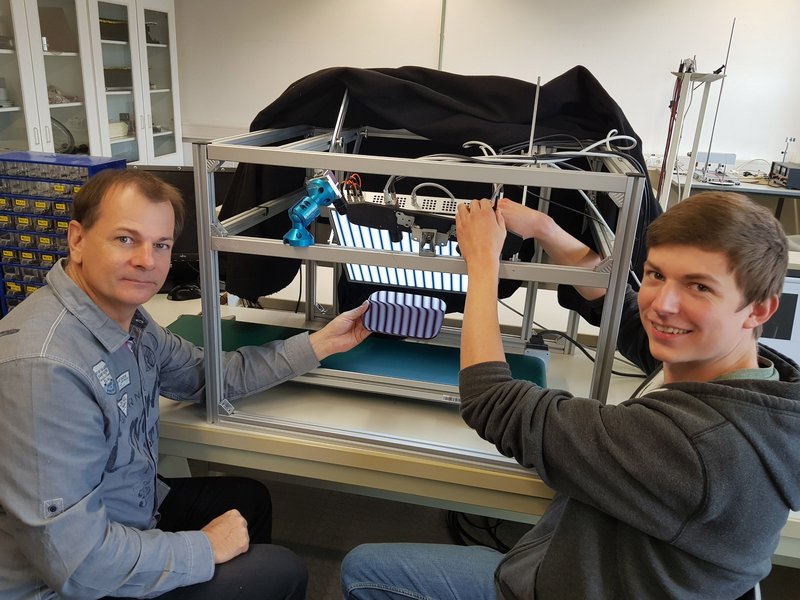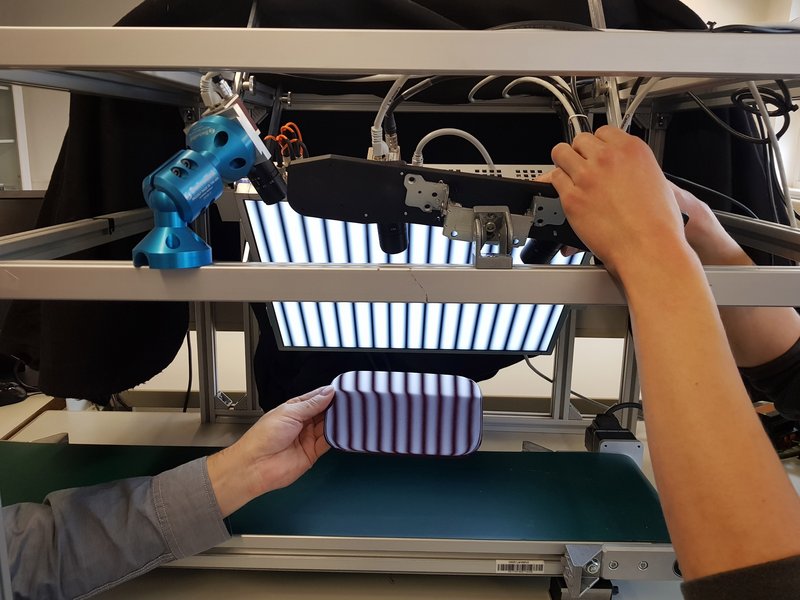Checking the seams of an airbag in a car for the smallest defects or inspecting optical components such as lenses requires high-precision technology. Until now, however, the associated measurement systems had to be laboriously redesigned for each new measurement task and optimised in elaborate laboratory tests according to the size and nature of the object. This is now set to change: in August, Landshut University of Applied Sciences launched the development of an innovative process that enables camera-based 3D measurement systems to be realised more efficiently than before with the use of modelling and artificial intelligence. The KISSMe3D project has received approx. 1.24 million euros in funding from the federal state of Bavaria. Landshut University of Applied Sciences has received a grant to the value of 362,100 euros. The project participants are Micro-Epsilon Messtechnik GmbH & Co. KG in Ortenburg and the Institute for Software Systems in Technical Applications of Computer Science (FORWISS) at the University of Passau.
To achieve the ambitious goal, the engineering knowledge and associated experience required for the design and optimisation of such systems are to be replicated in a computer. This is to take place with the use of a clever combination of physical modelling methods, such as those used for visualisation in video games, and artificial intelligence. The measurement processes for which this new method can be used at KISSMe3D include light-sectioning, deflectrometry for the measuring of reflective surfaces such as lenses and smartphone displays, and fringe projection for matt objects such as injection-moulded plastic parts. For this purpose, a laser, screen and projector are used. These three different light sources as well as the properties of the cameras used are now to be described as realistically as possible on a PC so that the optimum arrangement for each new measurement task can be determined “at the touch of a button”. “This approach allows for the development process to be hugely accelerated. The conceptual design, which can currently take several weeks to months, then takes place fully automatically on the computer,” explains Prof. Dr Christian Faber, a project manager at Landshut University of Applied Sciences, who, together with his research assistant Simon Hartel, is responsible for the physical modelling.
AI-based sensor learning
Cameras, lenses, screens and projectors can be modelled on the PC until a “digital twin” has been created. “It is no longer necessary to mount cameras at the practical level, as you can simulate everything on the computer,” Faber explains. “For objects that have complex surface structures, however, from a certain point, it is no longer worthwhile to make the modelling more and more precise – in other words, to make the digital twin more and more ‘lifelike’. That is where the artificial intelligence steps in, learning from the measurement data itself.” The intelligent system optimises itself automatically according to the new measuring task – a huge advantage for manufacturing production. The goal is to reduce the set-up time during commissioning by a long way, and to achieve an optimum measuring system in just a few steps which calibrates and adjusts further at the end customer through self-adapting sensor technology.
The practical implementation of this project requires versatile competences, in the field of the principles of optics and physics, AI methods, algorithms and sensor technology, as well as knowledge of industrial requirements. The three project partners therefore complement each other ideally: while the focus at Landshut University of Applied Sciences is on modelling for optical metrology, the focus at the University of Passau is on AI development. The company Micro-Epsilon Messtechnik GmbH & Co. KG focuses on the specification of the application scenarios, the provision of suitable sensor components and the construction of the demonstrators.
About the project:
The Modelling and Artificial Intelligence for Better Sensor Systems in 3D Measurement Technology (KISSMe3D) project is to run until January 2025. The project manager at Landshut University of Applied Sciences is Prof. Dr Christian Faber. The project partners are the Institute for Software Systems in Technical Applications of Computer Science (FORWISS) at the University of Passau and Micro-Epsilon Messtechnik GmbH & Co. KG in Ortenburg as leaders of the consortium.
Project name: | Modelling and Artificial Intelligence for Better Sensor Systems in 3D Measurement Technology (KISSMe3D) |
Project partners: | Landshut University of Applied Sciences |
Project management at Landshut University of Applied Sciences: | Prof. Dr Christian Faber |
Funding for Landshut University of Applied Sciences: | 362,100 euros |
Estimated total cost of the project: | 2,27 million euros |
Funding: | “Information and Communication Technology” R&D programme of the federal state of Bavaria (total funding, 1.24 million euros) |


